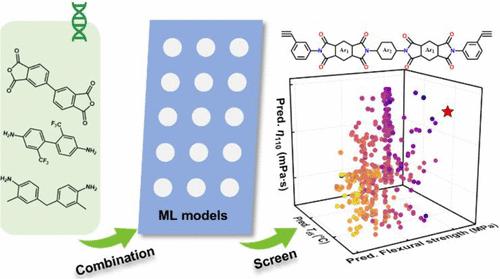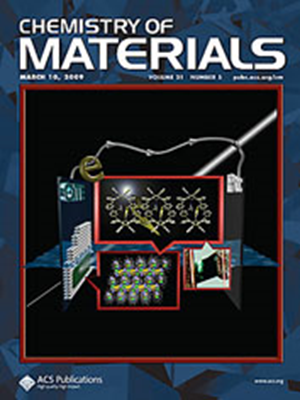Discovery of Copolymer Resins with Optimal Viscosity–Toughness–Heat Resistance Trade-Offs via the Material Genome Approach
IF 7.2
2区 材料科学
Q2 CHEMISTRY, PHYSICAL
引用次数: 0
Abstract
Accelerated discovery of polymer materials for specific applications requires the achievement of multiple, sometimes competing design objectives. Vast chemical space and the absence of well-established structure–processing–property relationships have considerably challenged the accelerated discovery of polymer materials. Herein, taking high-performance copolymer resins as an example, we propose a generalizable pipeline that integrates the screening of molecular structures, experimental validation of properties, and chemical interpretability to address both of these challenges. By means of the material genome paradigm, machine learning models are established for the structure–property relationship in conjunction with the additional viscosity for the evaluation of processing performance. Importantly, molecules of copolymer resins with low viscosity, high toughness, and high heat resistance are designed for a large search space. Experimental studies further verify that the newly designed copolymer resins possess excellent comprehensive performance, which cannot be achieved through time-consuming trial-and-error design methods. In addition, gene analysis is employed to interpret the structure–processing–property relationships of copolymer resins. The machine-learning-assisted material genome pipeline proposed in this work provides a promising strategy for the accelerated design of molecular structures in a large search space and for the understanding of structure–property relationships from data-informed perspectives.

求助全文
约1分钟内获得全文
求助全文
来源期刊

Chemistry of Materials
工程技术-材料科学:综合
CiteScore
14.10
自引率
5.80%
发文量
929
审稿时长
1.5 months
期刊介绍:
The journal Chemistry of Materials focuses on publishing original research at the intersection of materials science and chemistry. The studies published in the journal involve chemistry as a prominent component and explore topics such as the design, synthesis, characterization, processing, understanding, and application of functional or potentially functional materials. The journal covers various areas of interest, including inorganic and organic solid-state chemistry, nanomaterials, biomaterials, thin films and polymers, and composite/hybrid materials. The journal particularly seeks papers that highlight the creation or development of innovative materials with novel optical, electrical, magnetic, catalytic, or mechanical properties. It is essential that manuscripts on these topics have a primary focus on the chemistry of materials and represent a significant advancement compared to prior research. Before external reviews are sought, submitted manuscripts undergo a review process by a minimum of two editors to ensure their appropriateness for the journal and the presence of sufficient evidence of a significant advance that will be of broad interest to the materials chemistry community.
 求助内容:
求助内容: 应助结果提醒方式:
应助结果提醒方式:


